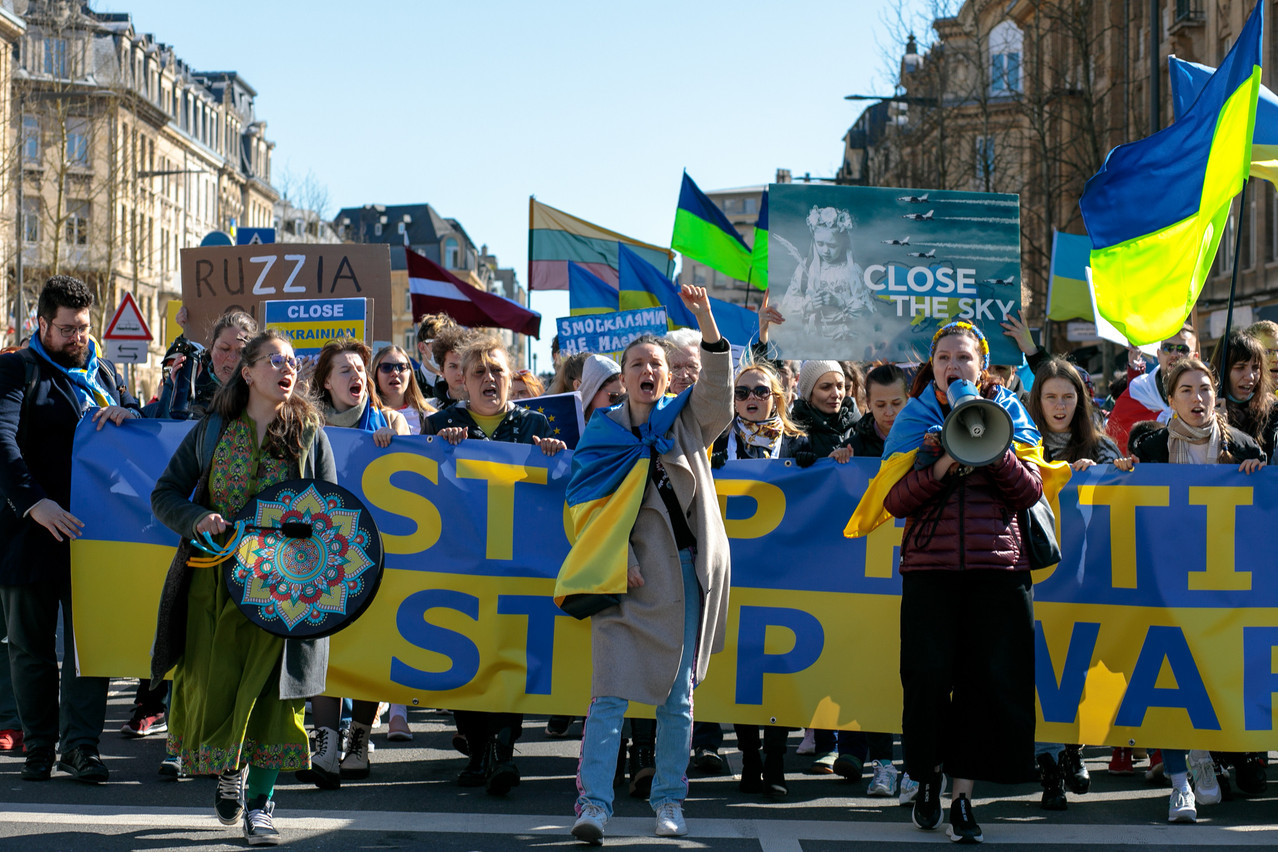On 24 April, it will be exactly two months since the war in Ukraine began. More than 7.1 million people are internally displaced and over four million people have fled their homes, according to the International Organisation for Migration. About 4,500 Ukrainians now living in Luxembourg are still trying to start over amidst the harsh realities from the ongoing war.
“Really it was not easy. My story is a story of survival,” explains retired political researcher, Irina, who moved to Luxembourg with her husband, thanks to the support of family and relatives. A day before the war broke out, she recalled a joyful birthday celebration with her family and then woke up the next morning to the news of war and low-flying helicopters as she and her husband watched from their windows. “We saw several explosions about five kilometres from us. It was really dangerous and we were scared. It felt surreal,” explained Irina.
One of the most difficult days (or so she thought) was on 27 February when the fields about 10 to 15 metres from their gate were ablaze for about two hours. “At that moment, we thought that this was the worst thing we’d experienced, but the worst part was still ahead of us.” The next day, they were completely cut off from all electricity, mobile and internet connections, but the thought of running out in the middle of a war seemed illogical amidst the non-stop sounds of artilleries and shelling attacks that kept them awake through the night. After managing to salvage some food and living in the basement for a few days, she explained the worst day came on 3 March. She peeked from the third floor of her house and saw Russian trucks stationed close to the forest in the area. About two hours later, the roof of the house was hit and went up in flames. They picked up their dog, phones, laptops, some money and documents, managed to escape from the house and were taken in by a kind neighbour.
“This was the most dangerous moment. But the fight continued with explosions all around us. And we could see the roof of our house falling down in flames.”
We wanted to leave as far away as possible from the occupied territory.
Her neighbour, Margarita--who is a middle-aged university professor of literature still offering classes remotely to her students now based in different countries--explained that after a few more days all together in their basement with very little supplies, they managed to organise and join a fleet of cars making their way over several days through different Russian checkpoints and rugged pathways till they reached Warsaw, where they were picked up and flown out to Luxembourg.
“We were scared to go with evacuation trains as they were over-crowded and, with our age and health, we feared we would not make the journey,” said Margarita
Both families have since applied for the temporary protection status and have settled into separate accommodations. Reflecting on their experience so far in Luxembourg, each person had positive messages to share about Luxembourg.
“Everyone we met on our way was so kind. Luxembourg people have shown great solidarity and hospitality to us,” said Irina.
A significant moment Margarita remembers was during the protest in Luxembourg, where she was able to connect with the Ukrainian community but was also given an opportunity to speak up and read out some poetry to inspire people--especially women supporting their communities during the war--and commended the heart-warming support from Luxembourg and other countries.
After going through administrative procedures, she hopes to start teaching Ukrainian literature to children in Luxembourg--and has started learning French. Also, she hopes her husband, a famous painter and master of restoration works, can continue working since his art isn’t limited by languages.
Angela, who describes teaching as both her profession and life’s calling, explained that her move to Luxembourg was also facilitated by relatives, having visited Luxembourg several times in the past. Although she describes her situation as less severe as her home was not destroyed, she explained that the permanent fear one experiences with the sirens going off all the time is a “very strange feeling, because when you don't feel safe, you don’t know what to do. You don’t know what you’re living for, and it feels like you don’t have future.”
Since her arrival, she has been teaching English to Ukrainian families with about 17 students so far. She commended the new speed of immigration procedures compared to the onset, when the processes were still quite ambiguous. However, she highlighted the “language problem” as a pain point for some and explained that although many are very motivated, it’s still quite difficult for some who may still be very homesick. “I’ve seen such people, they become hysterical, nervous and anxious. You can [only] help and try talking to them.”
I met amazing people that I can call guardian angels.
She explained her integration has been smooth, thanks to the huge support from several people from the border of Hungary to Luxembourg and also because of her past immigration experiences, having lived in the United States and South Africa. She tries to leverage her experiences and positive attitude in the classroom to encourage others.
“In my classes. I enjoy communicating with people, socialising with them, talking to them. And I can see their face becoming more relaxed. They start smiling more often and are more open and friendly. So it’s actually a nice feeling. I believe helping is a combination of things, they need help from outside and especially from their countrymen who can really share in their experience.”
“We are taking time to recover, and we know it will take ages,” says Irina’s daughter, Marina.
